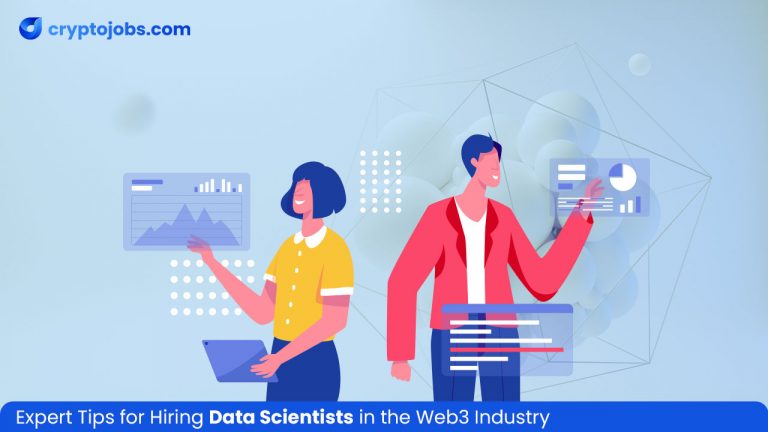
Expert Tips for Hiring Data Scientists in the Web3 Industry
- cryptojobs.com
- March 22, 2024
- All Posts, Hiring Advice
- hiring
- 0 Comments
Data scientists are essential to understanding and utilizing the massive volumes of data created as organizations move into the era of decentralized apps, blockchain, and smart contracts. Their importance in the Web3 industry cannot be disputed.
The merging of decentralized technologies and data-driven decision-making demands the hiring of exceptional personnel with the ability to deconstruct intricate databases and extract insightful information. As Web3 is adopted more widely, the market is becoming more competitive for qualified data scientists.
This guide will act as your compass as you set out to hire Web3 data scientists, including insights into the recruiting procedure, crucial talents to look for, and tactics to maximize your recruitment efforts.
We will explore the specific opportunities and difficulties that arise when hiring managers are looking for the best Web3 data scientists. Whether you are an established organization looking to strengthen your data analytics skills or a startup navigating the decentralized environment, these professional suggestions will help you make well-informed decisions and assemble a strong team of Web3 data scientists.
Step 1: Laydown Your Requirements
Start by outlining the precise duties of the data scientist position and explicitly stating the project needs. Describe the aims, purposes, kinds of data that will be used, and the specific knowledge and abilities that will be needed to make the data science project a success.
Step 2: Highlight the Skills Needed
Acknowledge and be up-front regarding the essential competencies and expertise required for the role of data scientist in your projects. This includes being an expert in statistical analysis, machine learning, data visualization, and programming languages like Python or R. It also includes being proficient in SQL, having expertise with data cleansing and modification, and having domain knowledge relevant to your project.
Step 3: Expertly Craft a Clear Job Description
Create a comprehensive job description that outlines the requirements for the data scientist position, including experience requirements, role duties, and credentials. Indicate the necessary competencies, including mastery of essential programming languages and tools, experience with statistical modeling and machine learning methods, and any other training or certifications that are relevant to your project.
Step 4: Review Resumes with Keen Eyes
Review the applicants’ resumes and portfolios that engaged with your job posting. Seek applicants who have a solid understanding of statistical analysis and machine learning methods, as well as relevant expertise in data science and the necessary programming languages and tools. Take note of their prior work, their aptitude for managing complex data issues, and their history of obtaining insightful conclusions from data.
Step 5: Conduct Initial Screening
Make a shortlist of the most qualified applicants using their portfolios and resumes. Start with preliminary phone interviews or video interviews to assess candidates’ abilities, communication styles, and cultural fit. Ask them about their background in data science, statistical modeling, machine learning, and problem-solving strategies.
Step 6: Analyze Technical Skills
Take into consideration putting in place a technical evaluation to determine applicants’ aptitude for data science and problem-solving. This might entail giving applicants access to a dataset and asking them to analyze it, build prediction models, or suggest fixes for issues that are driven by data. Examine how well they can apply statistical principles, make efficient use of machine learning methods, and communicate the results.
Step 7: Conduct In-person or On-call Interviews
Invite the best applicants for video or in-person interviews. Inquire more about their technical expertise during these interviews by asking about their knowledge of statistical modeling, machine learning, data manipulation, and teamwork. Assess their critical thinking skills, meticulousness, and ability to concisely and effectively explain difficult ideas.
Check out: 7 Technical Data Science Interview Questions to Ask
Step 8: Cross-check with References
Before coming to a final selection, get in touch with the references that each candidate provided. Get information about their work ethic, dependability, technical expertise, capacity for meeting deadlines, and collaboration abilities by getting in touch with their former employers or clients. Find more about their background in data science and the roles they played in earlier data science initiatives.
Step 9: Extend the Offer
Once the ideal applicant has been found, make them a job offer. Have conversations on pay, benefits, and other relevant information. Prepare for talks and make sure that all parties are happy with the conditions. Extend a contract that is well-defined and contains all the information about the job, such as its duration, duties, and any special agreements.
Final Words
As businesses enter this revolutionary era, there is a greater need than ever for outstanding employees who can decipher complex databases and extract insightful information. The Web3 industry is seeing increased competition for skilled data scientists, which makes hiring new employees a calculated and careful procedure. We encourage you to use these professional suggestions as you set out to find outstanding Web3 data scientists.
Visit CryptoJobs.com to find a pool of skilled data scientists that are ready to assist you with your hiring needs. Utilize the knowledge from this guide to expedite the recruiting process and locate the ideal candidate for your Web3 projects.




